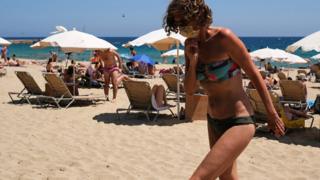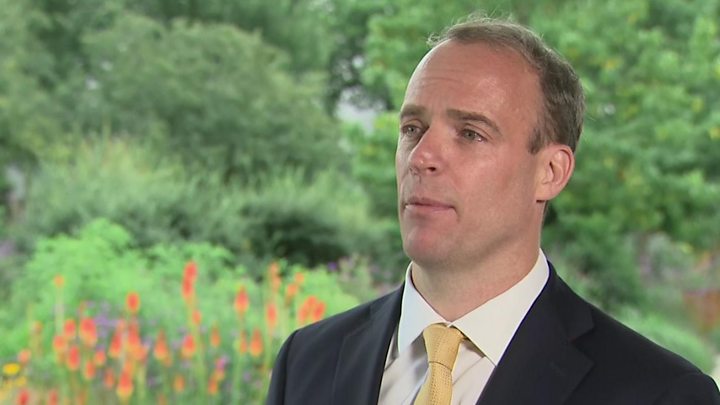 Image copyright
Reuters
Image copyright
Reuters
The government had to act "rapidly and decisively" to impose a quarantine on people arriving in the UK from Spain, a minister has said.
Health minister Helen Whately said the UK virus rate must be kept down to avoid a second spike.
Asked about a quarantine for other countries, such as France and Germany, she said No 10 will monitor virus rates and "take action" if necessary.
Labour has called for support for those having to quarantine.
The party says there is no guarantee employers will allow people to work from home for two weeks.
Ms Whately said that after all the "sacrifices" made during the lockdown, and now that restrictions are being "cautiously" and "carefully" reduced, the UK cannot take the risk of going back to a situation of rising virus rates across the country.
The new coronavirus travel rule was announced on Saturday evening following a spike in the number of new cases in Spain this week.
It came into force less than six hours after it was confirmed by the government, and requires returning travellers to provide an address where they will self-isolate for 14 days and or risk a fine.
During those two weeks, people must not go out to work, school, or public areas, or have visitors except for essential support. They should not go out to buy food if they can rely on others.
Andrew Flintham, the managing director of Tui UK and Ireland, the UK's biggest tour operator, called for a more "nuanced" quarantine policy that would allow customers to go to certain regions of countries with a lower number of infections.
The company has cancelled all mainland Spanish holidays until 9 August after the change in rules, but said all those going to the Balearic and Canary Islands could still travel as planned from Monday.
He told BBC Breakfast: "We'd really like a nuanced policy, so if there is a travel advice that says you can still go to the Canary Islands and the Balearics, we'd also like to have that backed up with a quarantine that obviously, isn't in place.
"If there's a travel advice that says you can't go, then we believe that clearly the quarantine should be in place.
"If we can have a lined up and regional policy, it will be much easier for us to communicate that to customers."
Image caption Helen Whately said the government had to act "rapidly and decisively" to impose a quarantine on people arriving in the UK from SpainAsked about this, and the difference in the number of new infections between mainland Spain and places like the Balearic Islands, Ms Whately said that she recognised that rates are "lower in the islands" but that they were going up "very rapidly in some locations, not just in mainland Spain" and No 10 had to take scientific advice on how to "best protect the UK".
She urged anyone considering booking a holiday to "be mindful that we are still in the situation of a global pandemic".
Asked about whether people arriving from other countries, such as France and Germany, could also soon have to quarantine, Ms Whately said No 10 will monitor virus rates and "take action" if necessary.
She told BBC Radio 4's Today programme: "It is the right thing for us to do to keep an eye on the rate in these countries, so if we see something going on, like we've seen in Spain, we would have to take action."
She said the so-called air bridges to other countries would be kept constantly "under review", adding that the government is "enacting the policy" it had committed to doing when they were first brought in.
Labour's shadow home secretary Nick Thomas-Symonds criticised the "chaotic nature" of the government's decision-making and urged it to bring in "smarter" measures at airports rather than a blanket quarantine.
He told the Today programme: "We certainly would be following the advice and introducing protective measures at the border if there are spikes in cases in other countries, absolutely.
"But there are two serious questions around this. The first is why we are still employing the... blunt tool of the 14-day quarantining rather than smarter measures and secondly the chaotic nature of the decision-making which certainly hasn't bred confidence in the government's approach."
He added: "I think you need a smarter set of quarantine measures at the airport. I've suggested this test, trace and isolate regime but you can also have temperature checking and other things - you look at a range of measures."
Foreign Secretary Dominic Raab on Sunday defended the "swift decision", saying he knew it would cause disruption for holidaymakers but that the government "can't make apologies".
Image copyright AFPAlmost 1.8m people were due to fly from the UK to Spain before the end of August, according to analysis by travel experts The PC Agency.
Now it is feared many passengers will abandon their plans to travel to Spain and other destinations.
Quarantine measures apply to those returning from mainland Spain, the Canary Islands and the Balearic Islands, such as Majorca and Ibiza.
Returning travellers must provide an address where they will self-isolate for 14 days and failing to do so could result in a fine.
During those two weeks, people must not go out to work, school, or public areas, or have visitors except for essential support. They should not go out to buy food if they can rely on others.
People who do not self-isolate can be fined up to £1,000 in England, Wales, and Northern Ireland and those returning to Scotland could be fined £480, with fines up to £5,000 for persistent offenders.
A small number of people travelling to the UK will be exempt from having to quarantine, such as registered health or care workers or those with pre-arranged health treatments.

Media playback is unsupported on your device
The director general of the Confederation of British Industry (CBI), Dame Carolyn Fairburn, said the new measures would have a "chilling impact" on the tourism industry, and that "there are lessons to be learned".
"Anyone going abroad now will know that this can happen," she told BBC Radio 4's Westminster Hour programme. "It was in the small print, but I'm not sure that people knew that that advice could change so quickly.
"I do think there is also a real consideration around the tourism industry itself."
However, she said the government had made the right decision "given the rising infection levels".
Her comments come after airlines including British Airways criticised the new measures as "yet another blow" to British holidaymakers.
And the Airport Operators Association said the new measures would "further damage what is already a fragile restart of the aviation sector, which continues to face the biggest challenge in its history".
Your questions answered
What should I do if I'm are already in Spain? Continue your holiday, follow the local rules, return home as planned, and regularly check Foreign Office (FCO) travel advice, the government says.
What about if I have a trip to Spain booked? Contact your travel provider, as some holiday operators like Tui have cancelled trips to mainland Spain. The FCO is advising against all non-essential travel to mainland Spain, but that does not include the Canary Islands and the Balearic Islands, such as Majorca and Ibiza. However, anyone arriving from any part of Spain, including its islands, must quarantine.
What will happen with travel insurance? For people already in Spain, the Association of British Insurers said it's "likely" insurance will stay in place until they return home. Otherwise, those travelling now against FCO advice will invalidate their insurance. If in doubt, check with your insurer.
Read more here.
On Thursday, Spain recorded 971 new infections - the biggest daily increase since Spain's lockdown ended - and 922 on Friday.
But on Sunday, the country's foreign minister insisted it was safe to visit, saying "the outbreaks in Spain are perfectly controlled."
Foreign Office guidance advising against all but essential travel to mainland Spain does not include the islands, but ministers opted to apply blanket quarantine arrangements across the Spanish territories.
Are you travelling to the UK from Spain and facing a 14-day quarantine? How will this affect your work? Email haveyoursay@bbc.co.uk.
Please include a contact number if you are willing to speak to a BBC journalist. You can also contact us in the following ways:
WhatsApp: +44 7756 165803 Tweet: @BBC_HaveYourSay Please read our terms & conditions and privacy policy
 5 years ago
529
5 years ago
529 

